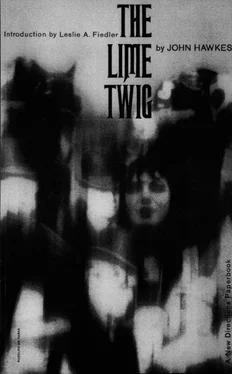How many are going to St. Ives?
Lines of people filed among the tables in the Pavilion, long lines wound between the little metal folding chairs all taken. They were coming down from the stands, from the stable area, from amusement tents, tramping across the beds of flowers left crushed or covered with spittle. White faces, a hat or two, a hearing aid, all packed together, stranger against stranger, and making their voices shrill over winnings or poor luck. The weight of them tipped a table up now and then, and spoons, forks with pastry on the tips, glassware, slid and fell from the edge. Those seated at the tables tried to drink, eat, talk, but everyone in the queues was laughing, stood staring down at the little round metal tops and puddles of lemonade and burned matches. There was a fat woman who carried her own sweets in a bag, and a cream puff had exploded against her cheek leaving bits of chocolate and egg white on her rosy skin. She was laughing from a deep stomach and dabbing with a fistful of handkerchief.
With the bottom of his trousers wet, brown hat on the back of his head, shirt crumpled and pinched lips smashed together, there was no happiness of the throng for Michael Banks, and he struck out at an elbow, at a shoulder blade, as hard as he dared. He saw the young woman immediately and gave a whistle. But it was drowned in the noise and upset of a waiter’s tray.
She had a table to herself and had saved him a seat. She was drinking pink water and gin out of a tall glass and there was a second pink glass for him on the scratched metal table edge before his chair. A giant pair of binoculars lay between her glass and his and the long strap was bound safely round her wrist. Her red hair was like the orange of an African bird, and when she sipped, the jockey-pink rose water sent a delicate color up to a row of tiny pearls which she had sunk into the deepness of the hair.
“I’m Sybilline,” she said.
He looked at the tip of her tongue and smelled the gin. Suddenly in the midst of weak eyes, puffy shirts, wallets stuffed with photographs of dead mothers and home, and on his person carrying still the clamminess, he found himself thinking he could bear the crowds for this, and felt his feet dragging, his fingers pressing white against the sticky metal of the chair. Yet he was brief.
“You wanted a word with me?”
“Oh, come off it now,” she laughed. “Sit down and have a drink with Sybilline.”
He did not remove his hat. He kept his back straight and with both hands seized the frosted glass, drank heavily. Everyone else wanted fish and chips or onions, but the gin and pink water was enough for him. There were fine soft flaming hairs on the woman’s arms, freckles like little brown crystals out of the sea. The sun struck through the canvas and lighted her, here in the midst of a crowd which lifted his chair then allowed it again to settle. He hung on, swallowed, watched the way she breathed — there were holes cut in the tips of her brassière — and the way her fingers always curved round her windpipe when she brought her free hand to her throat. She was thin if anything and her skin was white as if it had taken all the skin’s pigmentation, flesh color, to tint the hair.
“What did you want of me then?” he asked, and the chair was inching about beneath him, man and chair pressed into motion by the crowd on the Ouija board of the Pavilion’s floor.
And quickly, brightening up: “I’m here for the weekend only and, fancy now, there’s you! I’ve had a look through these,” raising the strap of the binoculars, “and the fellow who owns them is gone. Aren’t you glad? Things just come to pass, for a girl. For you, too, if you can only manage a little cheer in your face! Here, you carry them.”
Slowly he put the strap over his shoulder. “But I haven’t heard of you before,” he said, and let the cold glass click against his teeth.
A small narrow man, appearing drunk and soldierly and wearing a red beret over an ear like a twist of leather, stumbled out of the queue and flung his arm round the woman’s shoulder, shoved his cheek against the woman’s cheek so that Banks saw the two heads together, the fair skin with its emulsion of cream and the scrap of the fellow’s jaw, the green eyes meant for a mirror and the other eyes good only for sighting at a game of darts, the little red beret crushed into the softness of her orange hair. The man’s breath stirred the pinkish curls and his short fingers were biting into the plain cloth above her breast. He was stooping, hugging her for balance, and Banks watched the two pairs of eyes, the twitching when movement came finally to the intruder’s lips:
“Catch her while you can, Tosh,” staring then, taking a breath too big for him, as if he himself had nobody in the world. “Stairways and stars, remember!” And Sybil-line laughed, and with a hand on the man’s thigh pushed him off so that he ducked quickly into the crowd.
Only her own eyes were left and Banks could not frown at them. “I’m a married man,” he said. But there was a waltz coming out of the speaker, and she was laughing, twisting a curl the color of nail polish round her finger.
When they stood up, binoculars falling now against his hip, the fat woman and three others began fighting for the chairs, and his glass, still half-filled with gin, toppled and splashed on anonymous shoes and socks dropped carelessly below the ankles. But already Sybil-line had him by the hand and Larry watched them going off through the crowd.
So Little Dora was left alone with Margaret. And Thick, driving the black van that had oil and sand smeared over the hand-painted name, was sent with Sparrow to the flat in the street at Dreary Station. Sparrow was agile now, climbed down from the cab and walked easily with the suitcase in his hand. Thick was grinning because he always liked a smashing. The sun lighted up the window boxes and the face of an old dog behind a fence; from far-off came the sounds of all the girls sewing in the factories.
“Gas johnnys,” Sparrow told Mrs. Stickley and went with Thick to the flat and bolted the door from the inside. They took out the tools of the trade and in half an hour shredded the plant that the cat had soiled, broke the china quietly in a towel, stripped linen from the bed and all clothing out of the cupboards and drawers and closets, drank from the bottle found with the duster and pail. They cut the stuffing in bulky sawdust layers away from the frames of the furniture, gutted the mattress.
The high bells were ringing and Sparrow and Thick were done sawing the wood of the furniture into handy lengths, in sheeted bundles had carried out to the van the wood and the pieces of lingerie and puffy debris of their work. Bare walls, bare floors, four empty rooms containing no scrap of paper, no figured piece of jewelry or elastic garment, no handwriting specimen by which the identity of the former occupants could be known: it was a good job, a real smashing; and at dusk, on a heath just twenty miles from Aldington, they stopped and dumped the contents of the van into a quagmire round which the frogs were croaking. The two men smoked cigarettes in the gloom and then drove on.
Sybilline had let go of his hand and for a moment he did not lose her, stepping closely behind her figure, her red hair, quite certain she was lovely, even down to the open shoes and bare heels more red and wrinkled than he expected. But then the sound of a young woman’s flat voice made him think of home, of Margaret; somebody knocked him in the side; and when he turned round again and discovered that Sybilline was gone he did not care. He was thinking of his wife Margaret and for the next hours fought alone through the crowd, thinking of her and sweating and becoming hungry.
And now, directly in front of the stands and just out of its shadow — above him was the tower with the gilded face of the clock hung over with canvas and a scaffold’s few swinging timbers — standing in one of the crowd’s brief islands of space, he put a sandwich of hard salted bread and cheese to his teeth and chewed quickly. Others were sitting: a few women with their legs out straight on dirty towels or a folded sweater; a man wearing a tall gray coachman’s hat with enormous red and green tickets sticking out of the band and now resting himself in an armchair, an overstuffed chair tonic-stained and running on makeshift wheels; a boy lying out on his back and asleep. But Banks, though breathing quickly and sweating, preferred to stand. He kept the cheese close to his mouth, bit into the bread. His long shadow was taking food.
Читать дальше












